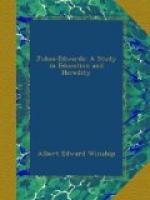Among the 285 college graduates of the Edwards family there are thirteen presidents of colleges and other higher institutions of learning, sixty-five professors of colleges, and many principals of important academies and seminaries. Forty-five American and foreign colleges and universities have this family among the alumni. From this family have come presidents for Yale, Princeton, Union, Hamilton, Amherst, the University of California, the University of Tennessee, the famous Litchfield (Conn.) law school, the Columbia law school, and Andover Theological Seminary. Among these are such men as President Timothy Dwight, Yale, 1794-1817; Theodore Dwight Woolsey, Yale, 1846-71; Timothy Dwight, Yale, 1886-97; Jonathan Edwards (Jr.), Union, 1799-1801; Daniel C. Gilman, Johns Hopkins; Merrill E. Gates, Amherst; and Edwards A. Park, Andover.
CHAPTER VII
AARON BURR
Undoubtedly some readers are already impatient at the delay in dealing with Aaron Burr. There was a time when it was the fashion to refer to Colonel Burr as sufficiently infamous to prove that heredity was of no appreciable value. As a matter of fact it is rather refreshing to have one upon whom the imagination can play. It simply intensifies the white light of the rest of the record.
Colonel Burr was not a saint after the model presented by his father, the Rev. Dr. Aaron Burr, the godly president of Princeton; by his grandfather, Jonathan Edwards; or by at least 1,394 of the other members of the family of Mr. Edwards. There is no purpose to give him saintly enthronement, but it may not be amiss to suggest that the abuse of him has been overdone.
Colonel Aaron Burr died at eighty after thirty years of the worst treatment ever meted out to a man against whom the bitterest enemies and the most brilliant legal talent could bring no charge that would stand in the eyes of the law. I have no purpose to lessen the verdict of prejudice, for the study of the Edwards family is all the more fascinating because of one such meteor of error. It must be confessed, however, that a study of the last thirty years of Colonel Burr’s life makes one more exasperated with human nature under a political whip than with Colonel Burr’s mistake.
At forty-nine Aaron Burr was one of the most brilliant, most admired, and beloved men in the United States. For thirty years his had been a career with few American parallels. He had but one real and intense enemy, and that man had hated him all those years. Alexander Hamilton had never missed an opportunity to vilify Mr. Burr, and his attack had never been resented. Calmly had Aaron Burr pursued his upward and onward course, simply smiling at the vituperation of Hamilton. Could those two men have agreed, they would have been the greatest leaders any nation ever had. Their hatred was as expensive as was that of Blaine and Conklin in after years.




